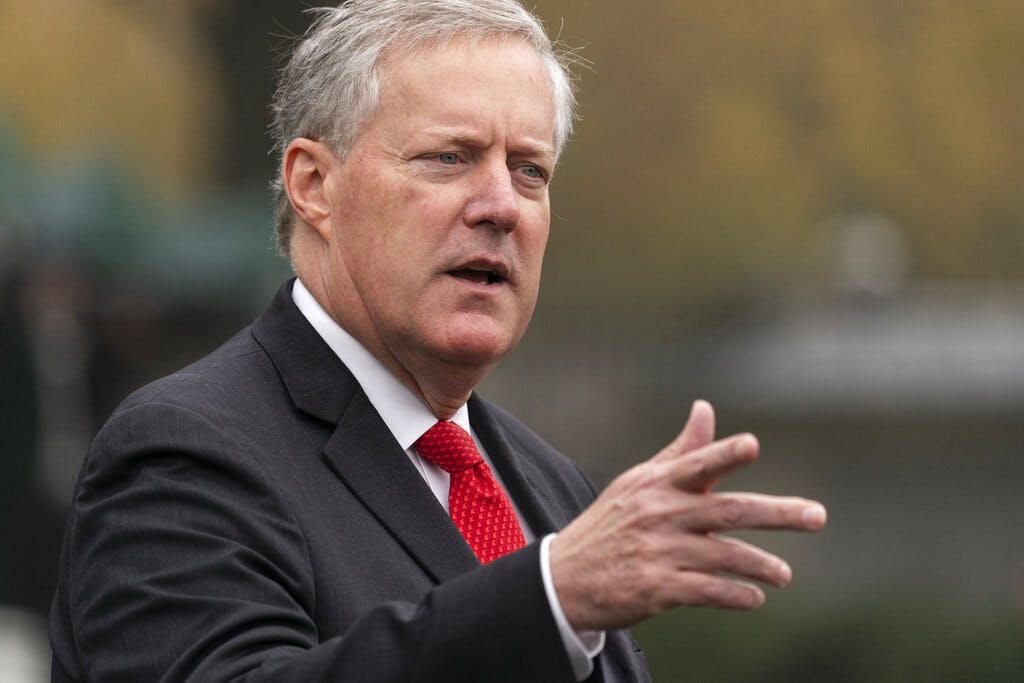The Constitution’s Supremacy Clause Is Staked Out by Trump’s Former Chief of Staff as a Safe Harbor Against State Charges Alleging Election Interference
Mark Meadows’s motion to dismiss the charges against him — based on the Constitution’s Supremacy Clause — could offer a preview of arguments being readied by the 45th president.

The motion by President Trump’s former chief of staff, Mark Meadows, to dismiss the criminal charges handed up against him by a grand jury in Georgia could offer a preview of the defense being readied by his one-time boss.
Mr. Meadows, who evaded charges in Special Counsel Jack Smith’s January 6 indictment, has emerged as something of a trailblazer among the 19 defendants whom District Attorney Fani Willis’s case comprises. He was the first to indicate that he would seek removal of the case to federal court — and now takes the pole position in asking that the charges be dropped.
The memorandum, lodged with the United States District Court for the Northern District of Georgia, argues that Mr. Meadows, a congressman who moved to Mr. Trump’s aide–de–camp from Tea Party firebrand, is “immune from state prosecution under the Supremacy Clause of the Federal Constitution.”
The Supremacy Clause ordains, “This Constitution, and the Laws of the United States which shall be made in Pursuance thereof shall be the supreme Law of the Land; and the Judges in every State shall be bound thereby, anything in the constitution or laws of any state to the contrary notwithstanding.”
Mr. Meadows argues that the case “threatens the important federal interest in providing the President of the United States with close, confidential advice and assistance, firmly entrenched in federal law for nearly 100 years.” Mr. Meadows quotes Supreme Court precedent for the proposition that the clause prohibits states from bringing “suits under state law against federal officials carrying out their executive duties.”
What “matters for Supremacy Clause immunity,” he argues, is that his conduct complied with federal law, even as it is alleged to have violated state law. The Georgia indictment is solely concerned with alleged Peach Tree State crimes — one count of racketeering, and one of solicitation of violation of oath by a public officer.
As far back as McCulloch v., Maryland, in 1819, the high court has held that states cannot enact laws that “retard, impede, burden, or in any manner control” federal officers in executing their duties. This means that state criminal law cannot interfere with federal employees who are executing federal law.
In In re Neagle, from 1890, the Supreme Court heard a case involving a United States marshal who, while protecting Justice Stephen Field, killed a man. The high court ruled that the marshal could not be prosecuted in California because he was “authorized to do [what he did] by the law of the United States.”
The former chief of staff quotes 11th Circuit precedent, binding in federal court in Georgia, for the notion that immunity from state court is activated when the actions in question “have some nexus with furthering federal policy and can reasonably be characterized as complying with the full range of federal law.” He calls this standard a “simple and lenient test.”
Guidance issued by President Biden’s Department of Justice in 2021 described the White House Office, established by President Franklin Roosevelt and led by the chief of staff, as the “President’s primary information-gathering and policy development-arm.” Mr. Meadows insists that the conduct charged by Ms. Willis “falls squarely within the scope of Mr. Meadows’s duties as Chief of Staff and the federal policy underlying that role.”
Mr. Meadows maintains that his prosecution “would hobble not just the Chief of Staff’s ability to carry out the role effectively, but Presidential operations generally.” He emphasizes that he is “neither charged nor identified as a co-conspirator” in Mr. Smith’s January 6 indictment. If federal law governs federal officers while they are carrying out their federal duties, then Mr. Smith’s silence speaks volumes, Mr. Meadows asserts.
While Mr. Meadows stakes ground in the Supremacy Clause, he also argues that his activities after the 2020 election lie in the “heartland of the First Amendment,” citing the Supreme Court for the idea that the constitutional protection “has its fullest and most urgent application precisely to the conduct of campaigns for political office.” Mr. Trump did “not cease to be a political candidate when the polls closed on election day,” and thus Mr. Meadows’s work was not done.
Mr. Meadows’s lines of argument could offer Mr. Trump a blueprint for his own briefing, which could lean on the Supremacy Clause as well. He, too, was carrying out federal duties during the interlude in question. Unlike Mr. Meadows, though, he could also point to the Take Care Clause, which uniquely charges the president to “take care that the laws be faithfully executed.” Expect that duty to double as a defense to prosecution.

